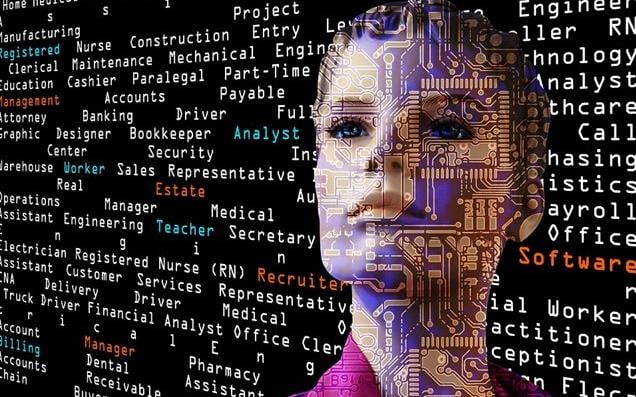Although Artificial Intelligence dramatically improves our world in many ways, there are notable concerns regarding the forthcoming impact of A.I. on employment and the workforce. There are predictions talking about millions of unemployed people in the next decades – primarily due to the impact of Intelligent Automation and A.I. systems. Other voices — which are also identifying the risk of technological unemployment – expect a positive impact on the society.
In any case, the entire socioeconomic system is entering a phase of accelerating transformation: markets, businesses, education, government, social welfare and employment models will be severely impacted. And, under certain conditions, this transformation will lead to an improved, more creative era for humanity.
Tasks, Roles and professions at risk
Tasks which are repeating in nature, can be easily automated, which can gradually make certain roles obsolete or even eliminate them. For instance, tasks and activities related to customer care/call centres, document classification, discovery and retrieval, content moderation are more and more based on technology and automation and less on human work. The same is true for roles related to operation and support of production lines and factories: humans are being replaced by smart robots which can safely navigate the space, find and move objects (such as products, parts or tools) and perform complex assembling operations.
But, A.I. proves to be very effective in handling even more complex activities — those requiring processing of multiple signals, data streams and accumulated knowledge in real time. A characteristic case is the autonomous vehicles which can capture and ‘understand’ their environment and its dynamics – they can ‘see’, decide and act in real-time, towards pre-defined optimization objectives.
Sectors that will be impacted
Transportation is already in a transformation mode – fully autonomous cars will be soon a reality – and they will be safer, more efficient and more effective. Professional drivers (taxi, trucks and more) will see the demand for their skillset dropping rapidly.
Electronic commerce will also undergo significant transformation: fulfilment centres will be fully automated, with robots navigating the space to collect products and execute customer orders; to be then sent or even delivered, also automatically, with autonomous drones and/or cars. The importance of salespersons and networks of physical stores will shrink; we are close to scenarios where A.I. agents on behalf of consumers negotiate with AI agents on behalf of retailers – based on different objectives, tactics and strategies.
Even more traditional professions which are built on top of strong relationships, such as legal professions, will be significantly impacted: typical support services in a legal context, are dealing with document handling, classification, discovery, summarization, comparison and knowledge management — tasks where AI agents can do a great job already.
Financial services, Insurance and any other sector requiring significant amount of data processing and content handling will also benefit from A.I. And of course states, governance and social mechanisms – Artificial Intelligence can have a great impact in eliminating bureaucracy, improving the service to citizens along with the design and performance of social programmes.
How Artificial Intelligence can replace human work – an example
Imagine a typical customer care – for instance serving the customers of a telecom company. Tens or even hundreds of specialized employees work with a shared mission: to handle customer requests, complaints, asks etc. in the best possible way (for the customer and the company).
The workstream of ‘handling a customer request’ can be broken down in separated jobs which are repeated overtime and across different types of requests, for instance: customer identification, customer history retrieval, request understanding and classification, problem identification and mapping to a solution space, forwarding or escalating to another team, customer document retrieval and finally the decisioning based on the suitable corporate policy or ruleset.
All the above can be covered with great effectiveness by A.I. algorithms – they prove to be faster, more accurate, reliable and cheaper than the corresponding team of humans. A properly trained A.I. system can understand customer requests in natural language, identify the mentioned or implied entities (for instance, which product or service the request refers to); it can estimate customer’s intent early enough (for example, to activate a service or ask for help); it can instantly process large volumes of data and apply the corporate policy in order to identify the best action/ decision for the particular case; the decision can then be communicated to the customer in natural language. The system also knows early enough if it can safely handle the request or not; in the latter case it knows where to redirect the request as an exception, for a human team to handle. And all these in milliseconds, as part of a chat or voice session between the customer and companies’ bot.
This AI-powered solution, requires just a small percentage of the human team that a traditional customer care department has. And, while this hybrid mode is in operation, the A.I. component learns from the exceptions it forwards to the human team to handle, leading to a continuous improvement of its performance. This feedback loop will eventually minimize the need for human intervention, making the AI system autonomous.
Getting ready
In the long run we will witness certain roles and jobs becoming less and less relevant, and finally obsolete. But, in most of the cases, Artificial Intelligence will have a supportive role to humans – empowering the human factor to perform better in handling complex and critical situations which require judgement and creative thinking. In parallel there would be numerous new roles and specialities with focus on technology and science. For example, there will be needs for highly skilled professionals to oversee and/or manage and/or coordinate the training of complex Artificial Intelligence systems; to ensure their integrity, security, objectivity and proper use.
Under certain assumptions, this technological revolution, will lead to a new era of prosperity, creativeness and well-being. Humans will no more need to perform routine, limited-value, jobs. The workforce and the underlying employment models, will move from long-term, full-time employment agreements, to flexible, selective premium services offering. There will be a stream of new business opportunities empowering the culture of entrepreneurship, creativeness and innovation.
The above positive outcome requires a common, shared understanding of the technology, its opportunities and also its risks. Societies need to adapt to the new technology landscape, become more flexible and inherit an attitude of lifelong learning. States need a new strategy with focus on education; they need to rethink how markets, companies and employment agreements should work in the new era of intelligent automation; they need to redesign the social mechanisms to cover a range of new scenarios and situations. At an even higher level, we need a solid framework to avoid the unbalanced concentration of technology power and control.
George Krasadakis
Technology Innovation Leader
George Krasadakis is a Product Architect with extensive experience in conceiving, engineering and driving innovative software products and online services to market; Innovation leader and technology inventor with more than 17 patents on Personalization, IoT, Artificial Intelligence, Analytics & Big Data, Content management, Natural User Interfaces and e-commerce.
NAFTEMPORIKI
3rd Technology Conference
Thursday, 28 January 2018
Royal Olympic Hotel, Athens
#Nconferences














